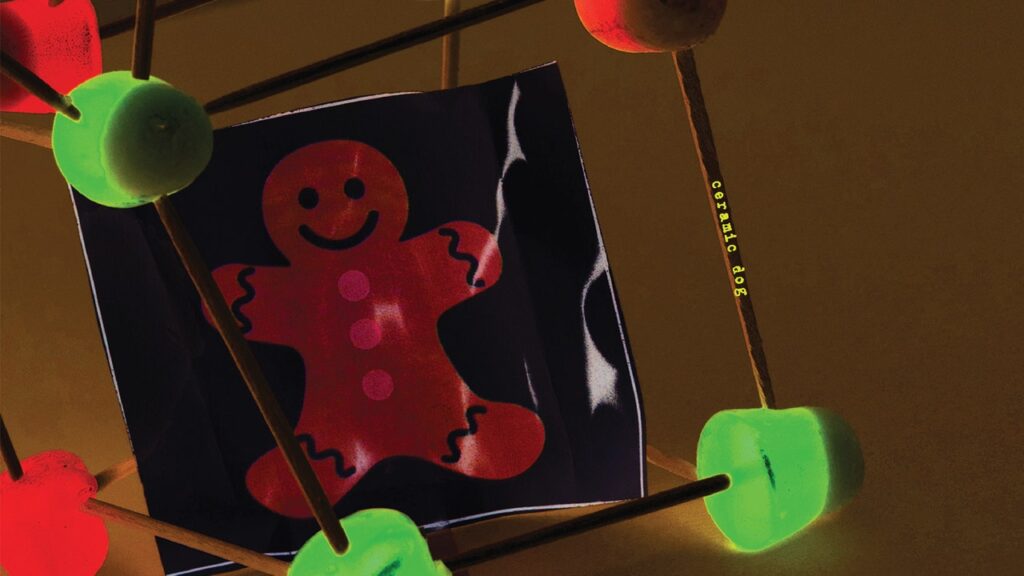
Marc Ribot keeps watering the roots of no wave. The New York genre, while it seemed to wither 40 years ago, is a key ingredient in his gloriously messy alchemy, which mixes flippant interpretation, heavy feedback, and agit-prop vocals with lofty traditions. The guitarist and composer has layered his scrappy voice over improvisatory jazz, crafted collections of celebratory Cuban montuno (on one track, Ribot sings in Spanish with a self-consciously bad accent), and recorded a volume of compositions by his mentor, Haitian classical guitarist Frantz Casseus. He’s been most consistent as leader of Ceramic Dog, a power trio of jazz geniuses who inflect literate rock with formidable chops. The synthesis is frenetic, potent, and at odds with the zeitgeist, even if Ribot’s lyrics decry today’s political oppression: Musically, he rejects both the voguish and the virtuosic in favor of his own whims.
The band hitches Ribot with bassist Shahzad Ismaily and drummer Ches Smith, musicians known for artfully changing horses midstream. Famously omnivorous, Ismaily is fresh off Love in Exile, a trio collaboration whose gorgeous, glacial changes are the polar opposite of Ceramic Dog. Smith, once the drummer for indie mainstays Xiu Xiu, has carved out a parallel practice as a composer and percussionist whose outsider immersion in Haitian music rivals Ribot’s. Mercurial tendencies can divide groups; they’ve kept Ceramic Dog together for 18 years, guiding the band as it skirts trendiness in favor of conviction. The three-piece offers a playfully naive idea of how rock might be in a world more invested in social justice than commerce: rambling and trenchant, like the dinnertime rant of a pissed-off family member.
Connection, Ceramic Dog’s fifth LP, stretches these abundant qualities into a rollicking, leisurely hour. Ribot and co. roll through rock, free jazz, boogaloo, son cubano, and, on their thrilling cover of “That’s Entertainment,” the popular songbook as filtered through post-punk. Along the way, they bludgeon us with the most direct rock song of their career, the title track and opener, which sacrifices charming bookishness for bruising force. Later, they proffer soul-stirring free jazz on “Swan,” abandoning the irony Ribot once honed as a member of the Lounge Lizards in favor of unambiguous beauty. Aided by James Brandon Lewis’ saxophone, the track is a gem at the record’s center, its prismatic light brightening the rest of Connection’s longform improvisations.
Ceramic Dog’s undersung last album, Hope, was a marvel of structure: Split along a line of symmetry, it separated Ribot’s talky concoctions from the band’s jams, a duality that felt almost spiritual. Connection dispenses with its predecessor’s deliberate formatting and, relatedly, a sense of tension. Ribot’s stylistic fascinations each get a moment in the sun: Hard-rockin’ singles adjoin conga rhythms, which bump shoulders with the political screed of “Soldiers in the Army of Love” and the dadaist babble of “Heart Attack.” Ribot previously complicated his leftist declamations with caustic zigzags, flitting between lucid indignation and cracked reasoning. “Muslim Jewish Resistance,” from 2018’s YRU Still Here, is a surprising, martial plea for the two faiths to unite against bigotry. “Hippies Are Not Nice Anymore,” from 2020’s Bandcamp-only EP What I Did on My ‘Long’ Vacation, hilariously logs the crowded road linking Woodstock idealism and cynical Silicon Valley riches.
On Connection, Ribot makes calls to action without the balancing weights of humor or self-consciousness. His progressive sentiments are welcome, and unfortunately more relevant than ever: “Fascists beat up on our brothers/Take the choice from our sisters/Hurt our non-binary siblings,” he barks on “Soldiers in the Army of Love.” But for the first time, he sounds wrapped so tightly in the Ceramic Dog flag that it muffles his commentary, obscuring his once skeptically raised eyebrow. “I don’t want you to give me nothing/Unless you give me ecstasy,” he announces on the louche “Ecstasy.” Its groove is sexy, rife with infectious syncopation and cool-as-a-cucumber sprechstimme. Ribot’s lyrics, though, are one-dimensional, which is surprising for a singer whose past outings have revealed so many surprises that straightforward passages served as necessary relief from the chaos.
Soaring peaks rise up from Connection’s expanse, such as the slippery transition between verse and chorus on “Soldiers in the Army of Love,” the bluesy build of “No Name,” or the 3/4 riff on “Connection,” which cuts against Smith’s common-time rhythm like a blade through tender beef. But the record can feel like a repository of quality ideas and B-side larks that don’t quite fit into a cohesive album. Last month, Ribot told a reporter that many of his current songs he once hoped other artists would record, before he realized that they were “much too weird.” He continued, “I decided I might as well put them out myself. And that’s what I’m in the process of trying to do now. Only there are so many of them that it’s been difficult to figure out how to put them together.” He’s still dirtying his would-be hits with no-wave scuzz, wearing his outré status as a deserved badge of honor. But Connection is the first time that Ceramic Dog has made dissent sound like just a collection of recordings, instead of a prickly, teeming world of its own.
